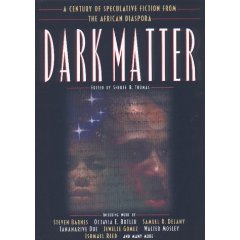Will Sheree R. Thomas Please Come Back?
 The mother of my third child left me years ago with a birthday present called Dark Matter: A Century of Speculative Fiction from the African Diaspora. I have finally gotten around to opening it and dabbling. This collection is edited by Sheree R. Thomas—and, based on the, ahem, ‘love’ in the comments from a previous post, I am obligated to recognize the fact that DJ Spooky is in it—in the back part, next to a great essay by Samuel R. Delany, “Racism and Science Fiction,” sprinkled with a critique directed at Blacks like me that capitalize the B.
The mother of my third child left me years ago with a birthday present called Dark Matter: A Century of Speculative Fiction from the African Diaspora. I have finally gotten around to opening it and dabbling. This collection is edited by Sheree R. Thomas—and, based on the, ahem, ‘love’ in the comments from a previous post, I am obligated to recognize the fact that DJ Spooky is in it—in the back part, next to a great essay by Samuel R. Delany, “Racism and Science Fiction,” sprinkled with a critique directed at Blacks like me that capitalize the B.
Remember, we do everything better—this includes reeking of liberal elitism, sadistic irony and white fascist conservatism—so, when an American person “of color” works hard to get something printed on white paper—for the slat-wall shelves in the “mainstream” as televised in the early 1990s, there is very little interest to publish online. This can come from time-management issues alone. Publishing online is seen a either a gutter thang for hick mud ducks or some “brave” experiment of “extreme” innovation of someone approved by the establishment. It is too easy for me to accuse professional colored folks that shun any serious online activity as the myopia of obsequious Negroes trying to second-guess their non-Black masters (real and imagined). What is most useful is to listen to “Noam Chomsky: Propaganda and Control of the Public Mind” here in the kinté space and get one big picture of the “universal audience.” The smart colored folks may have had it right all the time—once the big, multi-nationals take away the “open” Internet through net-neutrality attrition.
So, instead of assuming that a person with the bricks-and-mortar stature of Sheree R. Thomas would never publish anything regularly online without the encouragement of “white friends” and/or money, I dropped prejudice (for just a moment) and actually checked. I found Black Pot Mojo and am exceedingly pleased!
The only drawback is that she has stopped publishing as of June 2008. I can only hope the hope of the captive that she is just on vacation or something. Here are the highlights of her online style in Mojo:
- She writes on a monthly scale, which is impressive to me because her work schedule, taking her away from the computer, surely has to be very demanding. I write during my self-defined five days weekly because I am sitting at computers every business day.
- She is actually writing journal entries. I can tell that she is actually writing. I sense no condescension toward writing “for free” on the Internet. This indicates personal wealth—a surplus within her that literally means she is not totally sold out.
- She is actually using the Blog to write about her personal feelings instead of holding the Byzantine pose desperate to communicate non-desperation—the false calm of Roman peace.
- She writes in a ‘classic’ or ‘traditional’ style from the world of print instead of the Blackberry or twitter style. I prefer this way of writing because of this interesting juxtaposition of the old world and the new, cohering in continuity.I read her entire Blog—every single entry. Compared to what professional editors read and write under the bricks and mortar, this is not an impressive task at all. But, compared to the usual myspace suspects here on the Internet, me taking the time to do this much reading must be horrifying. I’m not a speed reader but I am not that slow either—I write way, way faster than I read… These Sheree R. Thomas moments are of note:
From “Soul Suckas, a digression, Then some love for Sekou & Sotigui”:
Over the past two or so years, I’d made a tough decision about cutting loose what some folk might call toxic personalities, negative vibers, who like to keep up a lot of nonsense and foolishness. You may know what I mean, individuals who don’t mean nobody no kind of good, never have a positive thing to say, unless it’s about themselves, but insist on staying in touch, supposedly to ‘see how you doin’, but mostly just to drain you. Soul suckas. They don’t reach out, until they want something, usually said something for free, and then you don’t hear from them again until the next crisis.
From “Octavia E. Butler Crosses Over”:
The last time I saw Ms. Butler was a very joyous moment, when she received the Langston Hughes Medal at CUNY. Surrounded by so many of her fans and lifelong friends I met at Clarion when we all applied because Octavia was teaching that year, the evening was magical, with music and an insightful interview by Wesley Brown. I remember still feeling shy around her, because she is, after all, one of my favorite authors in the world, and she reminded me of elders in my own family, warm, funny, keenly observant, and gracious as ever.
From “Stars in Her Eyes”:
Jarita C. Holbrook sees the world through many different sets of eyes.
And that’s a good thing, too, considering the amount of time she spends staring at the sky, usually as part of her research on African astronomy and culture.
But that’s not all. As an assistant research scientist at the University of Arizona Bureau of Applied Research in Anthropology, Holbrook’s research interests also include indigenous knowledge systems—especially astronomy, technology transfer, and lay astronomy practices—African Americans and science, and African history of science, technology, and medicine.
 Although her content is thinner than what most of the “Blog elite” would consider as serious contribution, what she does write about in a month is more diverse and more in depth—and involving more real people (especially humans in the so-called “arts” and sciences)—than what I can write in a whole year.
Although her content is thinner than what most of the “Blog elite” would consider as serious contribution, what she does write about in a month is more diverse and more in depth—and involving more real people (especially humans in the so-called “arts” and sciences)—than what I can write in a whole year.
I feel like I let Sheree R. Thomas down by being ignorant of her Blog for so long. But this is often how being on the Internet goes—one may not get instant gratification but over the years people do get into contact with the work. Almost all web sites are like a patch on a coral reef just looking at the ocean pass by… one deciliter at a time.
Based on, ahem, comments from a previous Blog post, it would seem that the number of comments is an indicator of personal popularity. Having followed hundreds of Blog sites closely and thousands more loosely, I know any strict, scientific research into this will reveal that Blog comment participation when controlled by ethnic group, economic class and age is not an indicator of personal popularity. I just know that this lack of participation through this single function would have nothing to do with Sheree R. Thomas losing interest in writing online. It can’t hurt to mention that the Black Pot Mojo technorati.com rating is about 200,000 points higher than mine with an “authority” five points higher than me! That is very impressive for a single, relatively infrequent Blog writer without a multi-national record deal and a crappy myspace page!
Apart from my vacation guess, taking on certain kinds of media-related employment demands that writing online must cease. Maybe Ms. Thomas is working close to Malaika Adero? (Also it must be stated that Ms. Thomas grants herself the right to moderate comments.) I want to know!
Black Pot Mojo is a Blog for grown folks—folks old enough to know who Octavia Butler is… I look forward to the Mojo coming through 2009… Wow! What was that? I just dared to fantasize that Ms. Thomas would actually read my Blog posts (at least one month’s worth) and point out editorial errors and real opportunities for critique… I just cannot see her as being “too good” to do this because of me, personally… Some people actually do this for fun! Once they are actually located, sometimes the ideas overshadow the egos.
Note: Jarita C. Holbrook edited a book called African Cultural Astronomy: Current Archaeoastronomy and Ethnoastronomy research in Africa (Astrophysics and Space Science Proceedings). It sells for over $100 on Alibris and Amazon.com. This price has to be beaten—right? A hick like me just cannot afford to drop cash on a book like this on any given Sunday. This is the third time I have run into this high price issue when trying to get some real African material.
